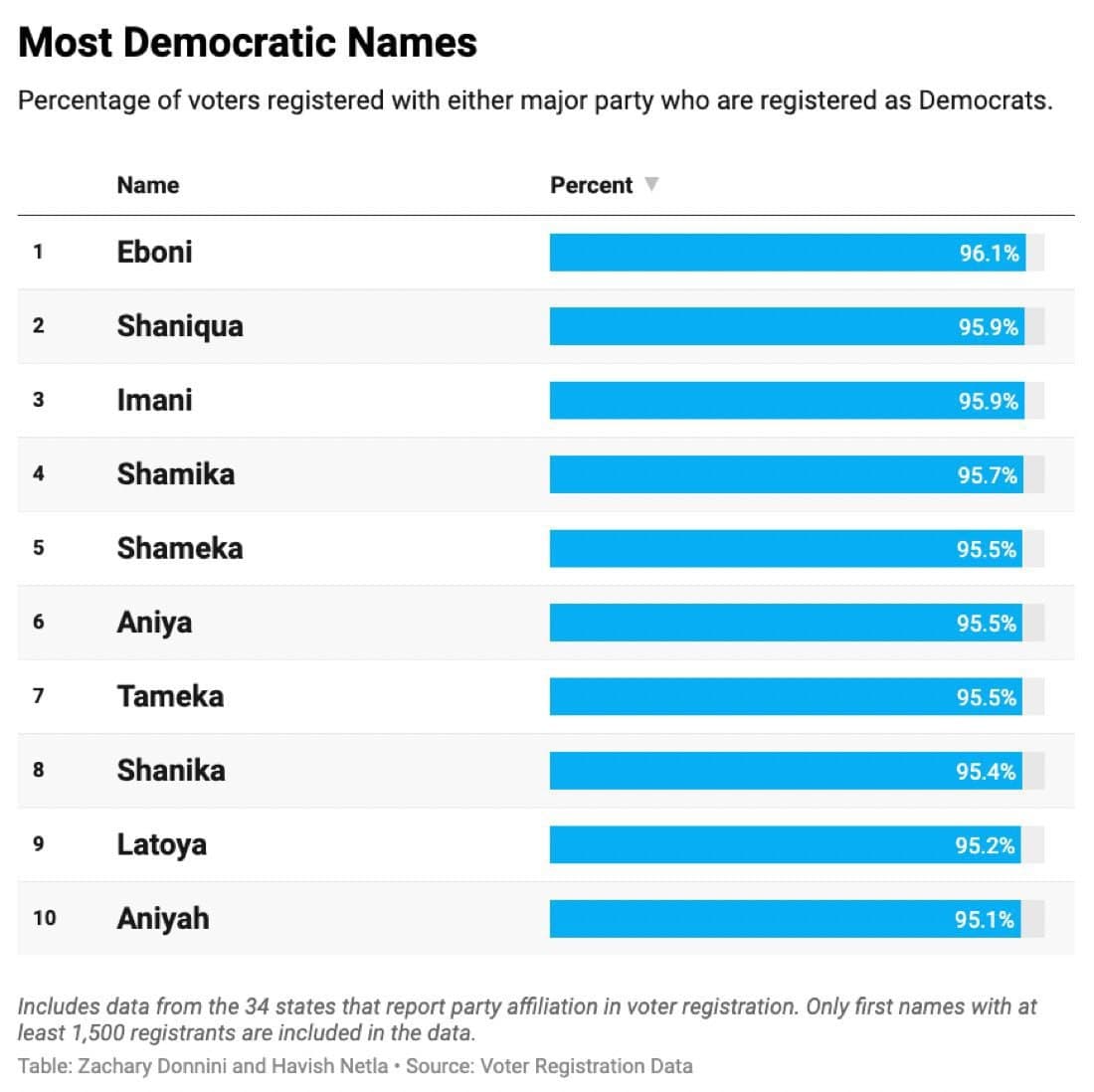Analysis Reveals "Eboni" and Four Other Names Signal Strong Democratic Ties Among Voters
In a surprising analysis of voter trends, a recent study has identified five names that appear to correlate strongly with Democratic affiliation among U.S. voters. The names Eboni, Shaniqua, Imani, Shamika, and Shameka emerged as the top indicators of Democratic preferences, shedding light on the intersection of identity, culture, and political alignment in America. This revelation comes at a critical time as the nation gears up for the 2024 elections, prompting discussions about the implications of such findings for political campaigns and outreach strategies.
Background & Context
The relationship between a person"s name and their political affiliation has long been a topic of interest among sociologists and political analysts. Names can reflect cultural heritage, socioeconomic status, and even regional identities, all of which can influence voting patterns. The emergence of names like Eboni and Shaniqua as indicators of Democratic allegiance highlights how cultural identity intertwines with political ideologies in the United States.
In recent years, the Democratic Party has made concerted efforts to engage with diverse communities, particularly among younger voters who increasingly prioritize inclusivity and representation. As the party seeks to understand its base better, insights from studies like this one could play a crucial role in shaping campaign strategies and outreach programs.
Key Developments
Researchers utilized a combination of voter registration data and demographic information to identify the names most commonly associated with Democratic voters. The analysis revealed that Eboni ranked highest, followed closely by Shaniqua, Imani, Shamika, and Shameka. These names are predominantly of African American origin and reflect cultural backgrounds that are historically aligned with Democratic values, such as social justice, equity, and community support.
The implications of these findings are significant. Political strategists may leverage this data to tailor their messages and outreach efforts to resonate more deeply with voters who share these identities. Understanding the cultural significance of these names can help candidates connect with communities on a more personal level, which is essential in an increasingly polarized political landscape.
Broader Impact
The identification of these names as indicators of Democratic affiliation opens up broader discussions about the role of identity in American politics. Experts suggest that this trend reflects not only demographic shifts but also a growing recognition of the importance of cultural narratives in shaping political ideologies. Dr. Angela Rivers, a political sociologist at the University of Chicago, notes, "Names often carry stories and histories. Recognizing the significance of these names could help political parties engage more effectively with voters who feel their identities are often overlooked."
Historically, names and their associations have played a role in voter mobilization efforts. For instance, during the Civil Rights Movement, names associated with African American culture became symbols of resistance and empowerment. The current analysis may signal a revitalization of this approach, as candidates seek to honor and uplift the identities of their constituents.
What"s Next
As the 2024 election cycle approaches, political parties will likely take note of these findings and adapt their strategies accordingly. Campaigns may prioritize outreach to communities where these names are prevalent, employing targeted messaging that speaks directly to their experiences and concerns. Additionally, discussions surrounding identity politics are expected to intensify, as candidates navigate the complexities of appealing to a diverse electorate.
Moreover, the analysis underscores the importance of data-driven approaches in modern campaigning. As previously reported in recent developments regarding political alliances, understanding the nuances of voter demographics can provide a competitive edge in an election landscape that is more dynamic than ever.
Political analysts will continue to monitor how these trends evolve leading up to the elections. The intersection of names, identity, and political affiliation will remain a crucial area of exploration, shaping not only campaign strategies but also the broader narrative of American democracy in the years to come.



![[Video] Gunfire between Iraqi security forces and Sadr militias in Baghdad](/_next/image?url=%2Fapi%2Fimage%2Fthumbnails%2Fthumbnail-1768343508874-4redb-thumbnail.jpg&w=3840&q=75)
